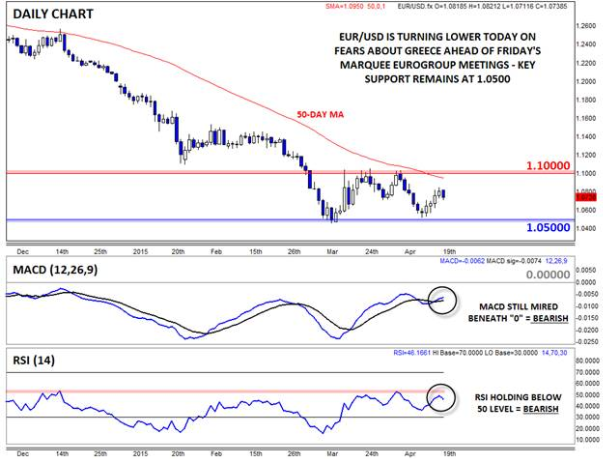The buck is bouncing back as North American traders kick off a new trading week, and the proximate cause is the same one that’s been recurring on and off for over half a decade now: concerns about Greece’s finances. It was on April 23 2010 that Greece’s Prime Minister George Papandreou first requested an international bailout, officially kicking off the cycle of “Greece Unease” periodically driving the euro lower. Just two weeks ago, EUR/USD sold off as Greece struggled to make its €450M debt payment to the IMF and traders are already worrying about the Mediterranean country’s next debt bill on May 12. As it currently stands, Greece has almost no chance of meeting the €11 Billion in required payments over the course of June and July.
For that reason, Friday’s Eurogroup meeting will be a critical hurdle. At that summit, the Eurozone finance ministers will meet to discuss what reforms Greece must enact in order to secure further aid. Eurogroup President is taking the hard line in the run-up to the meeting, advising Greek Prime Minister Tsipras that he “must sometimes lead [his] people into a future, even if that means taking tough measures in the short term. (But) there has to be a longer-term perspective." Other finance ministers have expressed similar sentiments.
All of this tough talk has unnerved traders: Greek 2-year bond yields, which serve as a proxy for the likelihood that Greece will have to default on its debt, have exploded over the last few weeks, spiking all the way to 26% after starting the year near 10%. The Greek stock market is holding up slightly better, but is still down over 20% off its late February highs.
Technical View: EUR/USD
Interestingly, EUR/USD has been relatively resilient to Grexit fears, with the exchange rate bouncing around in its broad 1.05-1.10 range over the last six weeks. As we go to press, the pair is edging down to 1.0740, but by no means is it showing any signs of panic. Meanwhile the MACD and RSI indicators are relatively neutral, though they both reflect the longer-term downtrend with the MACD still well below its “0” level and the RSI indicator unable to break above 50.
As long as the concerns about Greece’s finances linger, EUR/USD will struggle to move sustainably higher (note: I’ve been writing variations of this sentence for the past five years). For this week, euro bulls will be looking to see if Eurogroup policymakers moderate their rhetoric heading into Friday’s crucial meeting, but if nothing changes, EUR/USD could reverse last week’s gains and retest key support at 1.0500.

Source: FOREX.com
For more intraday analysis and market updates, follow us on twitter (@MWellerFX and @FOREXcom)
